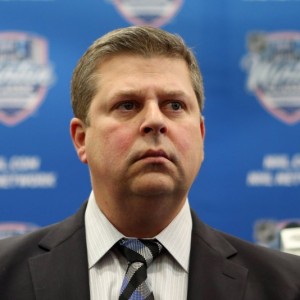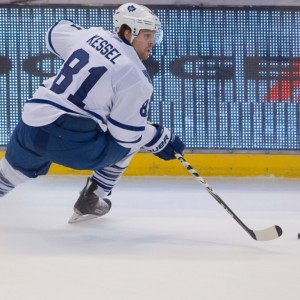I don’t write about hockey because I want to get a job as a journalist one day. To me, journalism isn’t all that exciting – impartial reporting just doesn’t do it for me. I write about hockey because hockey is one of my favorite things and writing is just something I do and have always done. So,when I sit down to write about the Leafs or the Coyotes, I may be coming it at if from a different perspective than some of my peers.
As a hockey blogger – as opposed to a salaried employee of a corporate media organization – I don’t have access to sources and resources. While The Hockey Writers has writers who do have access and sources, and who are credentialed, I personally do not. Partly because I live in the Toronto market, which has four major newspapers and two central Sports Media Companies that not only dominate the field but also own the team we’re all covering, but mostly because I’m not interested in doing that.
Instead of breaking news, I focus on analyzing the team and it’s transactions. Basically, instead of informing, my goal is to entertain and – when I’m lucky – to get people to think about things in ways they otherwise wouldn’t have. Obviously, there’s some hubris there but it’s inherent in just wanting to be a writer anyways, so……
Maybe because of this (and also possibly because I am, as one commenter recently pointed out, not fit to be called a “writer” but only a “contributor”) one thing people always say to me is “Jim, you’re not objective enough, you’re just a typical Leafs fan,” then they say that I am a fan masquerading as a journalist. But that just isn’t true: I am not a journalist and I don’t want to be one. I am a fan. That’s why I’m here.
This does create some problems though, because while I don’t ever pretend to be more than an enthusiastic discusser of hockey,there are still times when my personal interests do not coincide with what I know to be the “right” way to look at things. I mean, just because I am a fan, doesn’t mean I don’t try to look at the facts and data and come to the proper conclusion, it just means that I am very enthusiastic and excitable.
What Is Your Point?
I have one. I’m getting there…
What I am saying is that even though I don’t attempt to be an objective NHL reporter, I still try to back up all my ideas and opinions with facts or data (as I have it) while – hopefully – being willing to change my mind later, if necessary, as new information comes to light. I try not to let my personal love of the team interfere with my criticism, nor my love of certain players interfere with what I think is the best move for the team.
When I write about hockey, I know that absolute objectivity is impossible but that doesn’t mean that I don’t try to be objective and put aside my personal feelings when the information doesn’t back them up. For example, I love Kadri – he’s obviously one of my favorites – but at the same time, his statistical achievements warrant my enthusiasm, because the illogical gap between his actual statistics and the way the public seems to view him is unfathomable. (i.e He is massively underrated by Leafs Nation in general).
Even though I am making no bones about being doing this because I am just a ridiculous hockey-geek and massive, massive Leafs fan, I do try to look at the team’s best interests when I write, even if they don’t agree with what I, as a fan, want.
Take Phil Kessel. I am the biggest Phil Kessel fan I have ever met. As a grown man with several children, degrees, a car payment and a bloody financial planner, it is embarrassing how much I love the guy. When we first got him (as a special exception, I’ll allow myself to use the “we” pronoun just for this one article only) I was insanely happy. I defended the trade to everyone.

Even when it became apparent that Hamilton and Seguin were going to be really, really good, I defended the trade by combining the Kaberle trade with Boston that came later into one mega-trade. I mean, I will still give you an hour monologue on why, even today, I don’t hate that trade.
Still, when it came time for the Leafs to rebuild, I was open to trading him. I recommended that it should happen. I love Kessel, but he had to go.
Brian Burke is another person who I was a huge fan of. I was psyched when the Leafs hired him and enraged when they fired him. I bought in 100% to the Burke/Nonis plan and I even defended Nonis last summer. I defended the Clarkson signing, I loved Bozak.
In short, I wanted this team to win with Burke’s vision so badly that I copied Burke’s hairstyle on at least three different occasions.* After all the negativity and criticism, I really wanted Burke to get his due and throw it in the faces of all the naysayers.
But then, after doing this job for a while, I realized I couldn’t do it very well if I didn’t actually have data to back up my thoughts and opinions. It’s OK for regular people to have illogical opinions, but if you’re going to write them down and ask other people to read them, I figure you should at least be able to accurately explain why you have them. But I couldn’t do that, because most of what I thought was derived from goals, assists, points and things everyone agreed on.
When I started writing about hockey on the internet, I mostly read the mainstream papers/ sports shows. But obviously if you get a job as a hockey blogger, you’re going to start reading a lot of hockey blogs – which is where I saw much more nuanced and interesting takes on the game than I had previously encountered. All of a sudden, I’m saying “why does everyone hate Nonis and I am sitting here defending him?” What if Bozak isn’t as good as I think, or if buying out Grabovski was actually a way bigger error than I realized at the time? Because people I respected thought almost the complete opposite as I did, I took the time to educate myself about why that may be, which lead me to taking the time to learn about advanced stats and to try to understand some of the more progressive ways of thinking about hockey in 2015 – it turns out they were right and so I changed my mind.
A foolish consistency is the hobgoblin of the mind, if you know your Emerson.

At the risk of coming off as a converted religious fanatic, it was eye-opening for me to learn about the data available about any hockey player, game or season, and then to see how following that data to its conclusions made me question nearly every opinion I had about the game. It lead to me becoming critical of Burke, Carlyle, Nonis, Clarkson and Bozak – people who I’d previously thought were good and who I was personally a fan of. But did I only think this way because that’s what the mainstream media was telling me to think?
I mean, I was a huge Bozak fan. Sure, he’s no number-one centre, I’d say, but he’s solid defensively. Except, how did I know that? It was just repeated so often that I assumed it was true. But it isn’t and if you want actual proof, click this link. I mean, it’s not even close to being true and is a preposterous suggestion. Once I realized that my assumption was not only wrong, but actually ridiculous, I was forced to go re-evaluate everything I believed, and the results were not pretty.
The Kessel Trade
Anyways, as I came to realize that Burke was brutal and Nonis was worse, that the team they constructed was garbage, I had to reconcile this with the part of me who has just blindly loved virtually every Leafs player since I was a kid.
I remember when Brandon Convery was going to be a star. Then Alyn McCauley. Then Lonny Bohonos. Then Matt Frattin. You get the picture.
No more defending bad players just because they’re on the team I love. I was actually starting to become more objective, in spite of myself.

Things took a crazy turn for me when it became clear the Leafs were going to, and then eventually did, trade Phil Kessel. It sucks, but I endorsed the deal. Partly because from a position of weakness they were able to get back two firsts and a second for him, which, if you think about it: they also had him for five years, so that isn’t exactly a lot of depreciation, even if the players they got in return don’t end up as good as Seguin and Hamilton. But I also endorsed it because I now understand now that defensive players add a lot of value that maybe isn’t as easily understood or noticed as much as the value of the guys who score the goals is.
When I then hear that Kasperi Kapanen was rated as the best two-way player in his draft, I say to myself “if that translates to the NHL and he can score 25 goals, he’s probably not far off the true value that Kessel, even at his best, provides.”
And maybe that’s even true.
Or Maybe I’m just Lonny Bohonosing.
Either way, writing about the Leafs and trying to be somewhat objective is a challenge when the team trades away one of your favorite all-time players and you know it’s probably good for the franchise, but personally, you’re just pissed off that they wasted the best years of one of the few great players they have ever had in recent times. Trading Kessel is good. Trading Kessel is bad. We have always been at war with Eurasia. Eurasia is our greatest ally. And so on and so forth.
Enter Dion Phaneuf
But now with Kessel gone, there is Phaneuf. Same sort of deal. The Leafs can either get something for him, save cap space and give his roster spot to someone they want to develop, or they can keep him and have an expensive but useful player.What is better for the team in the long run?
My initial response is to say just move him like they moved Kessel. My fan response is that he’s been my favorite player since the Leafs acquired him in an absolute steal of a trade and I don’t want to see him in another jersey. I spent a good portion of the last five years arguing with people who don’t understand what a confirmation bias is that Dion Phaneuf is massively under-appreciated by the Toronto Market.

That if the Leafs only used him properly and had the players to back him up, that he’d actually be a great player. I spent hours upon hours wondering why the same fans who love Wendel Clark and Darcy Tucker don’t embrace Dion Phaneuf – whose mixture of toughness, hard-hitting and offense makes him similar in style to players the Toronto market has tended to embrace in the past.
When it came out that the Leafs might keep Phaneuf,I realized that as a writer,I faced an impossible choice: Do I endorse what is right for the team, or do I endorse what I personally want to happen?
I’ve written that the Leafs should trade Phaneuf. If they do, it’s not the worst idea. But, since the Leafs are clearly not interested in absolute tanking, as I (perhaps foolishly) assumed they would, I have started to reconsider. If you aren’t going to be horrible on purpose, then why give away players that are useful if you have to eat salary and won’t get very much back anyways?
What if the Leafs want to be competitive while they rebuild? What if the Florida Panthers model isn’t the best course to follow? What if my ideas about following Buffalo and Edmonton into Tankville were as stupid as some of the comments on my articles suggested they were? I started to think, after seeing the moves that the Leafs made so far this summer, that maybe I should consider changing my mind about this rebuild. Maybe you don’t want to be brutally bad. Specifically, maybe it’s better to draft 9th or 14th for a couple years while providing a stable environment for players to grow and develop their craft at the NHL level than it is to try to be too young, lose 60 games and hope for a McDavidesque prospect.
After all, the odds of finding a Kopitar (11th) or Bergeron (45th) or Datsyuk (171st) later in the draft are probably better than winning the draft lottery in a year with a “generational” talent.
If I accepted all that, wouldn’t that mean that I could not only cheer for the Leafs to keep my favorite player, that my jersey would still be valid, and that I could, with integrity, publicly write that I also thought it was the best move?
Maybe it does.
And maybe after all, the Leafs should keep Phaneuf.
Thanks for reading.
